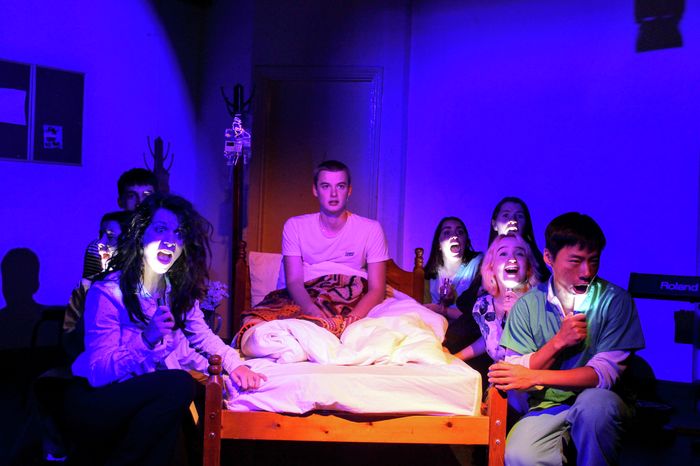The Cambridge Greek Play: the spectrum of human experience is on display
The Greek Play has always been unmissable, and this year it’s because of the staggering ability of the cast.

Every three years, The Cambridge Greek Play is put on by a cast of Cambridge students and graduates. A tradition that began in 1882, this year it consists of two pieces of Greek theatre, Aeschylus’ Persians and Cyclops, a rarely produced satyr play by Euripides.
Director Daniel Goldman and composer Alex Silverman have reunited for this production after their successful collaboration on the 2019 Greek Play Oedipus at Colonus. As per tradition, both plays are performed entirely in Greek—subtitles are provided for the audience, but there’s no crutch for the actors.
Maria Telnikoff brings an enviable strength and gravitas to her role as Atossa, the matriarch in Persians. Against the backdrop of a red sky, the chorus recounts the failure of the Persian army and tallies the dead. Katrina Rose makes an exceptional chorus leader as she outlines how their warriors, “the flower of Persia”, have been slaughtered, and misled by Atossa’s son, King Xerxes.
Telnikoff’s best moments occur when Atossa’s facade of strength slips and we see what is beneath it: a wife and mother dragged to an emotional precipice. Mithiran Ravindran’s approach to the role of her “all-powerful” husband, Darius, is rooted in a terrifying authority. It was a highlight of the production.
When their son Xerxes (Saul Barrett) limps onstage, it’s a gorgeous contrast to the command his father exercises. There’s a deftness to Barrett’s portrayal of the arrogant “god-like hero from a golden family,” demanding respect that he refuses to earn.
But some of the best performances came from the trio of messengers: Leo Gardner, Georgina Hayward, and Zoë Bond. They play off each other beautifully, grouped together in rags on the edge of the stage as they try to relay the horrors they’ve witnessed.
Where Persians is an observation on trauma and grief, Cyclops is a much-needed relief from it. This classic story of Odysseus and the cannibalistic giant features elaborate puppetry, while the chorus put on fishnets during the interval to play a herd of sheep.
Cyclops is delightful. Odysseus, masterfully played by Ilya Wray, is dressed like some combination of a Greek hero and a low-budget cheerleader. Jude Ashcroft, who voices the cyclops, Polyphemus, brings ease and lightness to his role as “the sea god’s ugly, one-eyed son.” Saul Bailey makes a fantastically expressive Silenus. The three of them, plus Barrett as Polyphemus’ head, are spectacular.
The ensemble is warm, natural, and watchable. Cyclops makes it even more apparent that Goldman has cast well. There is an artful use of the chorus in both plays.
The Greek Play has always been unmissable. In years when talent is thin on the ground, it might be because of its inherent history. But this year, it’s because of the staggering ability of the cast.
This is a spectacle. Not a gaudy one, but a production that taps into a powerful undercurrent of emotion. The spectrum of human experience is on display. It demands to be seen.
 Comment / Cambridge’s tourism risks commodifying students18 April 2025
Comment / Cambridge’s tourism risks commodifying students18 April 2025 News / Cambridge student numbers fall amid nationwide decline14 April 2025
News / Cambridge student numbers fall amid nationwide decline14 April 2025 News / Greenwich House occupiers miss deadline to respond to University legal action15 April 2025
News / Greenwich House occupiers miss deadline to respond to University legal action15 April 2025 Comment / The Cambridge workload prioritises quantity over quality 16 April 2025
Comment / The Cambridge workload prioritises quantity over quality 16 April 2025 Sport / Cambridge celebrate clean sweep at Boat Race 202514 April 2025
Sport / Cambridge celebrate clean sweep at Boat Race 202514 April 2025





